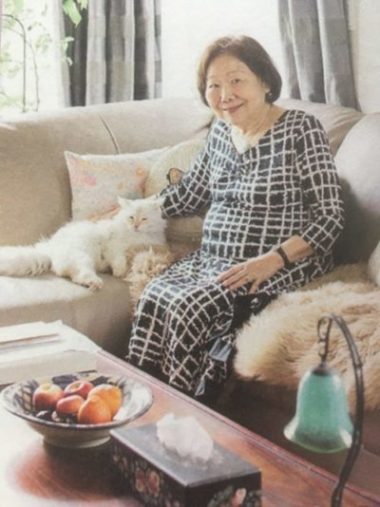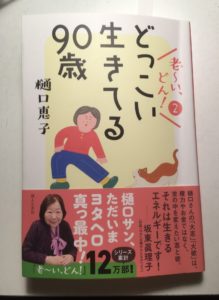
15 March 2023
Ms. Masako Osako, Executive Director of ILC Global Alliance Secretariat, recently sat down with Ms. Keiko Higuchi, President (rijicho) of a Japan-based NPO, Women's Association for the Better Aging Society (WABAS) and a leading social commentator and popular author in Japan. At 90 years old, Higuchi has recently published a new book titled, “Hold on! I am still alive and thriving at age 90,” which is a sequel to her enormously popular book published in 2019, “Ready, set, go! You are now becoming an “old-old person.”
Japan is currently ranked number one among countries in longevity, with an average life expectancy of 81.47 years for men and 87.57 years for women in 2021. At present, there are 36.2 million people aged 65 and over in Japan, constituting 29.1% of the population. Higuchi is keenly concerned with the issue of how “very old” Japanese people enjoy or cope with their longevity.
During the interview, Higuchi shared her thoughts on the concept of the “100-year life,” which has been popularized by books such as Lynda Gratton’s “The 100-Year Life” and AARP’s “Living 100.” While she believes that longevity is a blessing, Higuchi also believes that there is still much to be done to make society better for the elderly, and that older persons themselves can and should play a major part in the effort.
Higuchi draws on her wealth of personal and professional experience to speak on behalf of “average” older men and women in Japan with candor and humor in her book. She discusses common problems of old age, such as body aches, illness, disability, depleted savings, in-law problems, and loss of friends and family.

During the interview, Higuchi characterizes getting old as similar to “shugyo,” a term originally used to describe the rigorous daily training of a Buddhist monk striving to attain enlightenment. She believes that fellow older persons need to be realistic about what old age brings, while also being active in advocating for policy measures to make older persons’ lives safer and more comfortable.
Higuchi made several specific recommendations including:
- Every older person is a full-fledged citizen, even though some of his/her capabilities may decline. As such, each older person must make the effort to remain well-informed and exercise his/her right to speak up and influence public policy.
- Digital technology is here to stay. Higuchi’s NGO conducted a survey of cellphone and computer usage among seniors and found that (about) 2/3 of 1000 respondents used at least one of these items daily. She, therefore, argues that older persons need to make the effort to remain current with digital technology so that they can effectively advocate for their needs and access community services as fully informed users.
- Striving to be a good “care receiver” is important for older persons. They need to be well-informed about the variety of services available to them and motivate their caregivers to do a good job.
- Instead of “work- family” balance, there is increasingly a need to consider “work-family-caregiving” balance in order to support the growing number of family care givers who are themselves getting old.
- Higuchi stresses the importance of regular social interaction, such as having a meal with friends and neighbors. She proposes setting up a senior café in each primary school district where seniors get together and enjoy each others’ company on a regular basis.
The interviewer concludes Ms.Higuchi is a true social activist who is committed to improving society. She does this diplomatically and effectively with vision and humor. Referring to “Leave no one behind”, a major principle of the UN’s Sustainable Development Goals, she asserts that older persons themselves need to take action so that they will not be “left behind.”
Authors: Masako Osako, Phaenarete Hartley
Ms.Higuchi photo: Ikue Takizawa
Dynamic knowledge synthesis in local networks for coherent elderly care
We are getting older and more diverse, and that brings challenges. We cannot solve these challenges through healthcare alone. We also need municipalities, schools, companies, housing associations and older people themselves to achieve an age-friendly society. This requires cross-domain collaboration. But how can we achieve that?
25 April 2024
Event summary – Healthy ageing and longevity in Europe: How do we prepare for the 100-year life?
In partnership with ILC-UK, the ILC Europe Network hosted its inaugural conference in Brussels on 6 March 2024 to explore the challenges and opportunities associated with an ageing European society. Other ILC Global Alliance members in attendance included ILC-Czech Republic, ILC-France and ILC-Netherlands.
March 2024
White paper Arts in Health in the Netherlands: Art deserves a prominent place in healthcare
Much more attention needs to be paid to the positive effects of the use of art in healthcare. Art makes people feel better and helps them to better cope with their illness. Art can also mean a lot in the social domain and prevention, and in shortening hospital admissions.
February 2024


